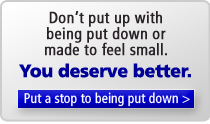Make one wrong move and you’re out on your ear. Screw up that new project, deliver that piece of work late or find yourself in the middle of a complex problem that you just can’t solve, and your boss will be straight on the phone to HR and asking IT to delete your account.
And that’s just if you have a job in the first place. If you’re currently interviewing, you gotta leave that interview room having instilled your prospective employer with confidence that you’re right for the job. Fail to do that and you won’t get the call back.
So how do you fill an employer with confidence?
I define confidence as being able to trust your behaviour with implicit trust in that behaviour. It’s one thing to do that for yourself (and if you’re not confident in yourself can you really expect someone else to be?) but it’s another deal entirely when someone else needs to have implicit trust in your behaviour.
What Doesn’t Instil Confidence
Let’s take a minute to look at some of the things you could do that would not instill confidence in an employer (current or prospective).
- Habitually turning up late and never showing you give a damn.
- Always sidestepping problems or giving problematic tasks to others, just because they’re too difficult.
- Blaming someone else when the shit hits the fan, and not getting involved in finding a solution.
- Only spending time on the cool stuff, and either forgetting about or quickly slapping together the rest.
- Missing meetings because you forgot or just couldn’t be bothered.
- Not giving a damn when someone in your team needs a hand with something.
- Never sticking around when the team need to dig deep to get something done.
- Going through the motions and just calling it in; never noticing quality or opportunity.
Believe it or not, but there are people out there who are like this. Yeah, what an asshole. Not you of course, I know you can kick ass and I know you’re bloody good at what you do. When you’re in there, doing it, firing on all cylinders, doing great work and getting great stuff done, there’s nobody quite like you.
And that’s what instills trust – a willingness to engage with the work and a willingness to engage with your own capability.
Demonstrate those 2 things (and use examples if you’re interviewing) and you’ll inspire trust and confidence in even the most beleaguered employer.
A Note for Employers
Same goes for you. If you’re not doing these things then your employees won’t have any confidence in your ability to lead, manage or even run a bath.
Engage.
- Other articles you might like:
- How Often Do You Think About Failure?
- How to give a confident interview
- How to get confident as a new Manager

 A friend of mine was telling me recently how his company has locked down Internet access for every employee. No shopping sites, no entertainment sites, no social media sites. To buy office equipment and computer equipment you have to apply to head office with details of the vendor, and you only get access if it’s approved.
A friend of mine was telling me recently how his company has locked down Internet access for every employee. No shopping sites, no entertainment sites, no social media sites. To buy office equipment and computer equipment you have to apply to head office with details of the vendor, and you only get access if it’s approved. This week sees me finishing up my
This week sees me finishing up my  So, it looks like I’m going to Amsterdam after all.
So, it looks like I’m going to Amsterdam after all. I recently had one of the world’s very best digital agencies all but begging me to go and help them out with a tricky piece of work for 6 months over in Amsterdam, one of Europe’s most vibrant and beautiful cities. They offered to ship me over, help me find an apartment (and pay for it), and pay me my top whack day rate. Plus, they’re a really good bunch of people doing some reall good and interesting work.
I recently had one of the world’s very best digital agencies all but begging me to go and help them out with a tricky piece of work for 6 months over in Amsterdam, one of Europe’s most vibrant and beautiful cities. They offered to ship me over, help me find an apartment (and pay for it), and pay me my top whack day rate. Plus, they’re a really good bunch of people doing some reall good and interesting work. James Cameron has comfortably beaten his own world record, as Avatar roars past Titanic to become the biggest grossing movie of all time. Whatever your criticism’s, there’s no denying that he delivered something that’s redefined the term “blockbuster”, and if you’re looking for blockbusting success as a freelancer or entrepreneur, here’s a guide to doing things his way.
James Cameron has comfortably beaten his own world record, as Avatar roars past Titanic to become the biggest grossing movie of all time. Whatever your criticism’s, there’s no denying that he delivered something that’s redefined the term “blockbuster”, and if you’re looking for blockbusting success as a freelancer or entrepreneur, here’s a guide to doing things his way. You won’t succeed in business without a healthy dose of self-confidence. Here are 30 reasons why natural self-confidence is so critical in business and entrepreneurship.
You won’t succeed in business without a healthy dose of self-confidence. Here are 30 reasons why natural self-confidence is so critical in business and entrepreneurship. The naughties might be over, but that’s no reason to stop being naughty. In fact, I downright encourage it.
The naughties might be over, but that’s no reason to stop being naughty. In fact, I downright encourage it.